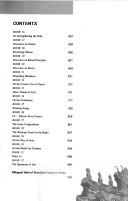The Noble Person Keeps Their Mind in Virtue
?????????????????????????????????????????????????????????????????????????????????????????????????????????????????????????????????????????????????????????????????????????????????????????????????????
Notes:
[Translated] The noble person knows that what is not complete or what is not pure is unworthy to be called beautiful. Therefore he recites and reiterates so as to integrate it, reflects and ponders so as to comprehend it, determines his associations so that he may dwell in it, and eliminates what is harmful in order to preserve and nourish it. He causes his eyes to be devoid of any desire to see what is not right, his ears to be devoid of any desire to hear what is not right, his mouth to be devoid of any desire to say what is not right, and his mind to be devoid of any desire to think what is not right. Having arrived at this, he takes utmost pleasure in it. His eyes will take greater pleasure in it than in the five colors; his ears will take greater pleasure in it than in the five sounds; his mouth will take greater pleasure in it than in the five flavors; and his mind will benefit more from it than from possession of the world. Therefore he cannot be subverted by power or profit, nor swayed by the masses and multitudes, nor unsettled by the whole world. He follows this in life; he follows it in death — this is what is called holding firm to inner power. He who holds firm to inner power is able to order himself; being able to order himself, he can then respond to others. He who is able to order himself and respond to others is called the complete man. Heaven manifests itself in its brightness; earth manifests itself in its breadth; the noble person values his completeness.
Folksonomies: virtue
Taxonomies:
/law, govt and politics/armed forces/army (0.397757)
/art and entertainment/humor (0.334962)
/law, govt and politics/government (0.328174)
Keywords:
noble person (0.983127 (negative:-0.515534)), greater pleasure (0.859945 (positive:0.602877)), Noble Person Keeps (0.756804 (neutral:0.000000)), inner power (0.677605 (positive:0.272598)), utmost pleasure (0.474104 (positive:0.657072)), desire (0.425580 (negative:-0.837256)), complete man (0.387158 (neutral:0.000000)), mind (0.358820 (negative:-0.213337)), ears (0.289132 (negative:-0.242026)), mouth (0.278423 (negative:-0.230451)), eyes (0.270889 (negative:-0.247782)), world (0.248283 (positive:0.038586)), firm (0.245856 (positive:0.272598))
Concepts:
Earth (0.899755): dbpedia | freebase
World (0.866820): dbpedia | ciaFactbook | freebase
English-language films (0.858447): dbpedia
Sound (0.838138): dbpedia | freebase | opencyc
Thought (0.811383): dbpedia | freebase | opencyc
Completeness (0.780672): dbpedia
The Masses (0.779253): dbpedia | freebase | yago
Brain (0.748119): dbpedia | freebase | opencyc






